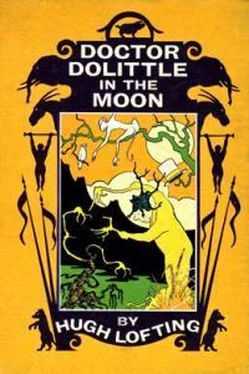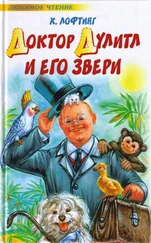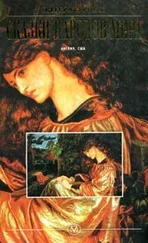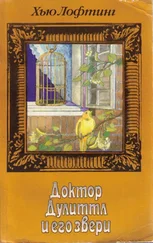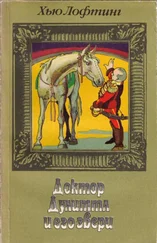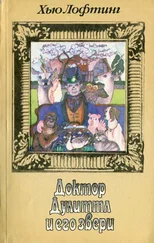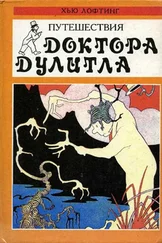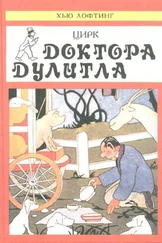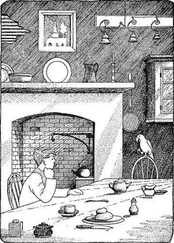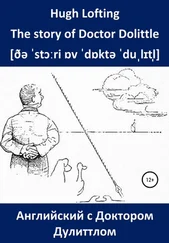Хью Лофтинг - Doctor Dolittle in the Moon
Здесь есть возможность читать онлайн «Хью Лофтинг - Doctor Dolittle in the Moon» весь текст электронной книги совершенно бесплатно (целиком полную версию без сокращений). В некоторых случаях можно слушать аудио, скачать через торрент в формате fb2 и присутствует краткое содержание. Год выпуска: 2014, Издательство: epubBooks Classics, Жанр: Сказка, на английском языке. Описание произведения, (предисловие) а так же отзывы посетителей доступны на портале библиотеки ЛибКат.
- Название:Doctor Dolittle in the Moon
- Автор:
- Издательство:epubBooks Classics
- Жанр:
- Год:2014
- ISBN:нет данных
- Рейтинг книги:5 / 5. Голосов: 1
-
Избранное:Добавить в избранное
- Отзывы:
-
Ваша оценка:
- 100
- 1
- 2
- 3
- 4
- 5
Doctor Dolittle in the Moon: краткое содержание, описание и аннотация
Предлагаем к чтению аннотацию, описание, краткое содержание или предисловие (зависит от того, что написал сам автор книги «Doctor Dolittle in the Moon»). Если вы не нашли необходимую информацию о книге — напишите в комментариях, мы постараемся отыскать её.
Doctor Dolittle in the Moon — читать онлайн бесплатно полную книгу (весь текст) целиком
Ниже представлен текст книги, разбитый по страницам. Система сохранения места последней прочитанной страницы, позволяет с удобством читать онлайн бесплатно книгу «Doctor Dolittle in the Moon», без необходимости каждый раз заново искать на чём Вы остановились. Поставьте закладку, и сможете в любой момент перейти на страницу, на которой закончили чтение.
Интервал:
Закладка:
"Are you ready, Stubbins?" asked John Dolittle.
Illustration
035 "'Are you ready, Stubbins?'"
"Yes, Doctor," said I, making sure my pencil point would last a while.
"Good," said he.—"Put it down":
The Doctor —"Do you like this stationary life—I mean, living in the same place all the time, unable to move?"
The Lilies —(Several of them seemed to answer in chorus)—"Why, yes—of course. Being stationary doesn't bother us. We hear about all that is going on."
The Doctor —"From whom, what, do you hear it?"
The Lilies —"Well, the other plants, the bees, the birds, bring us news of what is happening."
The Doctor –"Oh, do you communicate with the bees and the birds?"
The Lilies –"Why, certainly, of course!"
The Doctor —"Yet the bees and the birds are races different from your own."
The Lilies —"Quite true, but the bees come to us for honey. And the birds come to sit among our leaves—especially the warblers—and they sing and talk and tell us of what is happening in the world. What more would you want?"
The Doctor –"Oh, quite so, quite so. I didn't mean you should be discontented. But don't you ever want to move, to travel?"
The Lilies —"Good gracious, no! What's the use of all this running about? After all, there's no place like home—provided it's a good one. It's a pleasant life we lead—and very safe. The folks who rush around are always having accidents, breaking legs and so forth. Those troubles can't happen to us. We sit still and watch the world go by. We chat sometimes among ourselves and then there is always the gossip of the birds and the bees to entertain us."
The Doctor —"And you really understand the language of the birds and bees!—You astonish me."
The Lilies —"Oh, perfectly—and of the beetles and moths too."
It was at about this point in our first recorded conversation that we made the astonishing discovery that the Vanity Lilies could see . The light, as I have told you, was always somewhat dim on the Moon. The Doctor, while he was talking, suddenly decided he would like a smoke. He asked the lilies if they objected to the fumes of tobacco. They said they did not know because they had never had any experience of it. So the Doctor said he would light his pipe and if they did not like it he would stop.
So taking a box of matches from his pocket he struck a light. We had not fully realized before how soft and gentle was the light of the Moon until that match flared up. It is true that in testing our woods for smoke fuel we had made much larger blazes. But then, I suppose we had been more intent on the results of our experiments than on anything else. Now, as we noticed the lilies suddenly draw back their heads and turn aside from the flare, we saw that the extra illumination of a mere match had made a big difference to the ordinary daylight they were accustomed to.
"He struck a light"
14
Mirrors for Flowers
When the Doctor noticed how the lilies shrank away from the glow of the matches he became greatly interested in this curious unexpected effect that the extra light had had on them.
"Why, Stubbins," he whispered, "they could not have felt the heat. We were too far away. If it is the glare that made them draw back it must be that they have some organs so sensitive to light that quite possibly they can see! I must find out about this."
Thereupon he began questioning the lilies again to discover how much they could tell him of their sense of vision. He shot his hand out and asked them if they knew what movement he had made. Every time (though they had no idea of what he was trying to find out) they told him precisely what he had done. Then going close to one large flower he passed his hand all round it; and the blossom turned its head and faced the moving hand all the way round the circle.
"He passed his hand all around it"
There was no doubt in our minds whatever, when we had finished our experiments, that the Vanity Lilies could in their own way see—though where the machinery called eyes was placed in their anatomy we could not as yet discover.
The Doctor spent hours and days trying to solve this problem. But, he told me, he met with very little success. For a while he was forced to the conclusion (since he could not find in the flowers any eyes such as we knew) that what he had taken for a sense of vision was only some other sense, highly developed, which produced the same results as seeing.
"After all, Stubbins," said he, "just because we ourselves only have five senses, it doesn't follow that other creatures can't have more. It has long been supposed that certain birds had a sixth sense. Still, the way those flowers feel light, can tell colours, movement, and form, makes it look very much as though they had found a way of seeing—even if they haven't got eyes…. Humph! Yes, one might quite possibly see with other things besides eyes."
Going through his baggage that night after our day's work was done, the Doctor discovered among his papers an illustrated catalogue which had somehow got packed by accident. John Dolittle, always a devoted gardener, had catalogues sent to him from nearly every seed merchant and nurseryman in England.
"Why, Stubbins!" he cried, turning over the pages of gorgeous annuals in high glee—"Here's a chance; if those lilies can see we can test them with this.—Pictures of flowers in colour!"
The next day he interviewed the Vanity Lilies with the catalogue and his work was rewarded with very good results. Taking the brightly coloured pictures of petunias, chrysanthemums and hollyhocks, he held them in a good light before the faces of the lilies. Even Chee–Chee and I could see at once that this caused quite a sensation. The great trumpet–shaped blossoms swayed downwards and forwards on their slender stems to get a closer view of the pages. Then they turned to one another as though in critical conversation.
"He held them before the lilies"
Later the Doctor interpreted to me the comments they had made and I booked them among the notes. They seemed most curious to know who these flowers were. They spoke of them (or rather of their species) in a peculiarly personal way. This was one of the first occasions when we got some idea or glimpses of lunar Vegetable Society , as the Doctor later came to call it. It almost seemed as though these beautiful creatures were surprised, like human ladies, at the portraits displayed and wanted to know all about these foreign beauties and the lives they led.
This interest in personal appearance on the part of the lilies was, as a matter of fact, what originally led the Doctor to call their species the Vanity Lily. In their own strange tongue they questioned him for hours and hours about these outlandish flowers whose pictures he had shown them. They seemed very disappointed when he told them the actual size of most earthly flowers. But they seemed a little pleased that their sisters of the other world could not at least compete with them in that. They were also much mystified when John Dolittle explained to them that with us no flowers or plants (so far as was known) had communicated with Man, birds, or any other members of the Animal Kingdom.
Questioning them further on this point of personal appearance, the Doctor was quite astonished to find to what an extent it occupied their attention. He found that they always tried to get nearer water so that they could see their own reflections in the surface. They got terribly upset if some bee or bird came along and disturbed the pollen powder on their gorgeous petals or set awry the angle of their pistils.
Читать дальшеИнтервал:
Закладка:
Похожие книги на «Doctor Dolittle in the Moon»
Представляем Вашему вниманию похожие книги на «Doctor Dolittle in the Moon» списком для выбора. Мы отобрали схожую по названию и смыслу литературу в надежде предоставить читателям больше вариантов отыскать новые, интересные, ещё непрочитанные произведения.
Обсуждение, отзывы о книге «Doctor Dolittle in the Moon» и просто собственные мнения читателей. Оставьте ваши комментарии, напишите, что Вы думаете о произведении, его смысле или главных героях. Укажите что конкретно понравилось, а что нет, и почему Вы так считаете.
